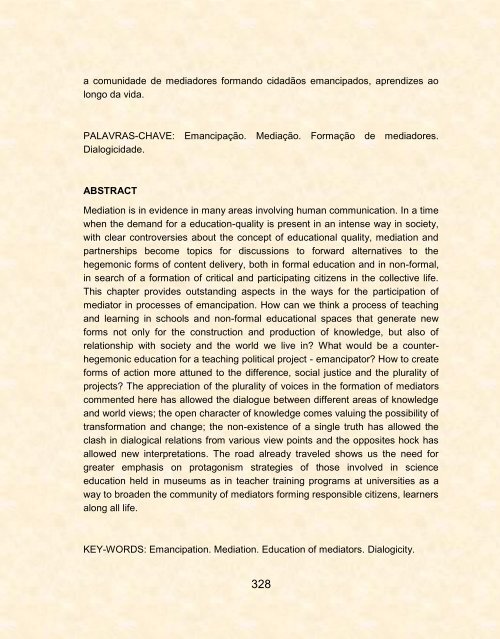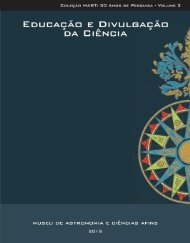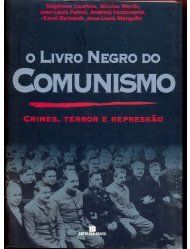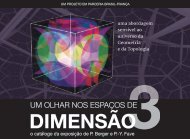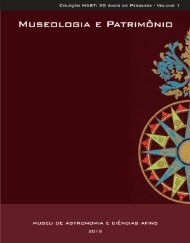- Page 3 and 4:
MAST: 30 ANOS DE PESQUISA Volume 2
- Page 5 and 6:
Ficha catalográfica elaborada pela
- Page 7 and 8:
AS DIFERENTES AUDIÊNCIAS DE MUSEUS
- Page 9 and 10:
PREFÁCIO EDUCAÇÃO, DIVULGAÇÃO,
- Page 11 and 12:
divulgação da ciência, pautou-se
- Page 13 and 14:
INTRODUÇÃO EDUCAÇÃO MUSEAL - A
- Page 15 and 16:
institucional em diálogo com todos
- Page 17 and 18:
à C&T. O Plano Plurianual (PPA) de
- Page 19 and 20:
no Brasil, com o apoio do Núcleo d
- Page 21 and 22:
museológico (BRASIL, Decreto nº 8
- Page 23 and 24:
sem entender essa instituição na
- Page 25 and 26:
[...] abrange uma grande quantidade
- Page 27 and 28:
professor. A descrição feita é d
- Page 29 and 30:
A última parte do livro intitulada
- Page 31 and 32:
campo da Educação em Museus no Br
- Page 33 and 34:
eleva o MAST e coloca a educação
- Page 35 and 36:
(Org.). O formal e o não formal na
- Page 37 and 38:
DIVULGAR CIÊNCIA: Que ciência? He
- Page 39 and 40:
Astronomia novas técnicas passam a
- Page 41 and 42:
transformado no bicho-papão dos ec
- Page 43 and 44:
elação com o mundo e sem a necess
- Page 45 and 46:
E avança no seu raciocínio: esgot
- Page 47 and 48:
ainda seja assaltado por paradoxos
- Page 49 and 50:
paralelamente, um paradoxal culto c
- Page 51 and 52:
MONTEIRO MATOS, Karla. Responsabili
- Page 53 and 54:
Museus no país, deve-se destacar o
- Page 55 and 56:
edes regionais e locais de institui
- Page 57 and 58:
organizações das Olimpíadas na i
- Page 59 and 60:
Ainda neste sentido, destaca-se o p
- Page 61 and 62:
conhecimento, que aumentou de 13% e
- Page 63 and 64:
Ciência e Tecnologia, desde a sua
- Page 65 and 66:
entre estes campos, face as contrib
- Page 67 and 68:
PERCEPÇÃO pública da ciência e
- Page 69 and 70:
TEMPOS DE MEDIAÇÃO: A protagoniza
- Page 71 and 72:
Ao trazer para o campo educacional
- Page 73 and 74:
um poder de associar e dissociar, d
- Page 75 and 76:
de oferecer respostas prontas, deve
- Page 77 and 78:
prática profissional do professor,
- Page 79 and 80:
proveitoso investigando no setor de
- Page 81 and 82:
a fronteira existente entre uma for
- Page 83 and 84:
professores nessa área. Assim, em
- Page 85 and 86:
GENOVESE, L. G. R.; DRUMMOND, J. M.
- Page 87 and 88:
A ALFABETIZAÇÃO CIENTÍFICA EM UM
- Page 89 and 90:
enquanto pesquisadoras, da atividad
- Page 91 and 92:
Neste sentido, a literatura legitim
- Page 93 and 94:
Jens Dolin, Robert Evans e Nana Qui
- Page 95 and 96:
estiveram presentes nos objetivos e
- Page 97 and 98:
e a popularização da ciência e s
- Page 99 and 100:
que explicitavam fenômenos cientí
- Page 101 and 102:
A germinação das sementes; a tran
- Page 103 and 104:
Durante as entrevistas 5 , diz um d
- Page 105 and 106:
fundamentais que regem e/ou nos qua
- Page 107 and 108:
Em outro texto, no item sobre o his
- Page 109 and 110:
Levar uma atividade de divulgação
- Page 111 and 112:
tanto para a atual como para as fut
- Page 113 and 114:
Por avaliarmos que é preciso que s
- Page 115 and 116:
LEMKE, J. L. Investigar para el fut
- Page 117 and 118:
MEDIAÇÃO HUMANA EM MUSEUS DE C&T:
- Page 119 and 120:
práticas culturais estudadas, a id
- Page 121 and 122:
acesso limitado às ações, sistem
- Page 123 and 124:
o significado é construído por me
- Page 125 and 126:
Figura 01 - Mediadora realiza visit
- Page 127 and 128:
grande importância para a eficiên
- Page 129 and 130:
Figura 05 - Meninos visitam o Museu
- Page 131 and 132:
Figura 06 - Mediador realiza uma vi
- Page 133 and 134:
Por meio da análise dos dados obti
- Page 135 and 136:
cognitivo: o início. Saindo da ind
- Page 137 and 138:
opção Péssima 7 . Esses dados po
- Page 139 and 140:
ocorrências para Falta de tempo, s
- Page 141 and 142:
Referências AIDAR, G.; CHIOVATTO,
- Page 143 and 144:
. Acesso em: abr. 2015. LOPES, M. M
- Page 145 and 146:
143
- Page 147 and 148:
como da própria história da ciên
- Page 149 and 150:
2 - A relação do MAST com as esco
- Page 151 and 152:
A prática dessas reuniões, além
- Page 153 and 154:
Para a CED, no que se refere às vi
- Page 155 and 156:
intermediário, no sentido de trans
- Page 157 and 158:
Foram discutidos temas voltados às
- Page 159 and 160:
3 - O grupo de pesquisa em educaç
- Page 161 and 162:
3.2 - Os estudos no âmbito da FINE
- Page 163 and 164:
que os professores de estilo constr
- Page 165 and 166:
Cabe destacar o projeto intitulado,
- Page 167 and 168:
da universidade utilizar as institu
- Page 169 and 170:
Foi também nesse período que a av
- Page 171 and 172:
questionários junto a 3.705 alunos
- Page 173 and 174:
levaram a pesquisadora Sibele Cazel
- Page 175 and 176:
e das pesquisas de recepção em ex
- Page 177 and 178:
pesquisa foram: questionário autoa
- Page 179 and 180:
CAZELLI, Sibele; GOUVÊA, Guaracira
- Page 181 and 182:
SEPÚLVEDA, M. (Org.). Museus, cole
- Page 183 and 184:
Talvez não desempenhem todos estes
- Page 185 and 186:
Ao final da década de 1980, a Asso
- Page 187 and 188:
esponder a pessoas com diversos tip
- Page 189 and 190:
americanos, sobre fatores promotore
- Page 191 and 192:
3.5 - O Museu Kreeger O Museu Kreeg
- Page 193 and 194:
ocorrem concomitantemente, de forma
- Page 195 and 196:
veteranos da II Grande Guerra, tend
- Page 197 and 198:
4 - Achados: o público, mil e uma
- Page 199 and 200:
Quando abordam desafios que o progr
- Page 201 and 202:
4.3 - O Programa e seu público com
- Page 203 and 204:
Bem, vou te contar...Meu primeiro p
- Page 205 and 206:
pesquisar disseminar e educar, e ap
- Page 207 and 208:
O MUSEU DE CIÊNCIAS E O DIÁLOGO C
- Page 209 and 210:
conceitos científicos difíceis de
- Page 211 and 212:
análise do paradigma educacional t
- Page 213 and 214:
espaldo de um laudo médico - docum
- Page 215 and 216:
qual as dificuldades na aprendizage
- Page 217 and 218:
4 - Desenvolvimento da pesquisa 4.1
- Page 219 and 220:
alta para que todos soubessem que e
- Page 221 and 222:
atividade de visitação, visando a
- Page 223 and 224:
com as expectativas que eles desenv
- Page 225 and 226:
forma, a visita auxiliará em uma m
- Page 227 and 228:
material que ela disse? O minério
- Page 229 and 230:
apresentadas. Além disso, o materi
- Page 231 and 232:
estabelecer novas relações de coo
- Page 233 and 234:
Destacamos a atuação dos museus e
- Page 235 and 236:
MINAYO, Maria Cecília de Souza. An
- Page 237 and 238:
ATIVIDADES DE DIVULGAÇÃO DA CIÊN
- Page 239 and 240:
Quadro 1: Algumas das principais a
- Page 241 and 242:
ealizaram estudos que iam além de
- Page 243 and 244:
3.2 - A divulgação da ciência -
- Page 245 and 246:
tática usada, para se conseguir is
- Page 247 and 248:
melhor podendo tomar decisões que
- Page 249 and 250:
comenta que como em qualquer organi
- Page 251 and 252:
não científicos não estejam aind
- Page 253 and 254:
A concepção do Brincando com a Ci
- Page 255 and 256:
conduzir o Brincando, considera a c
- Page 257 and 258:
Bakhtin (1986) e retomado por Amori
- Page 259 and 260:
seria relevante divulgar essa ativi
- Page 261 and 262:
significa o empenho em tornar o con
- Page 263 and 264:
programas de divulgação. Revista
- Page 265 and 266:
PASQUALI, A. Comprender la Comunica
- Page 267 and 268:
pessoas mais conscientes de seu lug
- Page 269 and 270:
Essas dificuldades desencadeiam a
- Page 271 and 272:
A cada ano é anunciado um tema cen
- Page 273 and 274:
Nessas três últimas edições, qu
- Page 275 and 276:
eclipses; (4) observação do Sol e
- Page 277 and 278:
5 - Projeto Olhai pro Céu - Uma at
- Page 279 and 280: montagem e vídeo desenvolvidos pel
- Page 281 and 282: Figura 04: imagem de um membro do g
- Page 283 and 284: Ruanda, Burundi, Etiópia, Quênia,
- Page 285 and 286: RELEA, Limeira, v. 4, p. 47-68, 200
- Page 287 and 288: institucionalização de disciplina
- Page 289 and 290: educativas, especificamente na capa
- Page 291 and 292: potencial para a promoção da moti
- Page 293 and 294: vez que se trata do lugar no qual
- Page 295 and 296: tipos de objetos são propostos: "o
- Page 297 and 298: elevante para se pensar cientificam
- Page 299 and 300: A história, a filosofia e a sociol
- Page 301 and 302: ciência e técnica; (iv) a mudanç
- Page 303 and 304: Acredita-se que a substituição do
- Page 305 and 306: dificuldades que surgem no desdobra
- Page 307 and 308: objetos históricos e interativos
- Page 309 and 310: COIMBRA, Carlos Alberto Quadros; CA
- Page 311 and 312: MATTHEWS, M. R. Historia, filosofí
- Page 313 and 314: RESUMOS E ABSTRACTS 311
- Page 315 and 316: KEY-WORDS: Popularization of scienc
- Page 317 and 318: popularization activities, to train
- Page 319 and 320: projects? The appreciation of the p
- Page 321 and 322: scientific literacy, it involves al
- Page 323 and 324: of their role in favor of the popul
- Page 325 and 326: OS PÚBLICOS, RECURSOS PARA OS MUSE
- Page 327 and 328: O MUSEU DE CIÊNCIAS E O DIÁLOGO C
- Page 329: TEMPOS DE MEDIAÇÃO: A protagoniza
- Page 333 and 334: OS INSTRUMENTOS CIENTÍFICOS DO MAS
- Page 335: 333


